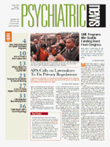If a child is hit on the head, one would not be surprised if brain injury results. But suppose a child experienced psychological trauma because of physical abuse. Could such psychological trauma harm the brain as well?
This possibility may seem rather far-fetched to some people, but not to Martin Teicher, M.D., Ph.D. Teicher is a developmental neuropsychiatrist and director of the Developmental Biopsychiatry Research Program at McLean Hospital in Belmont, Mass.
Teicher and his colleagues have held the hypothesis for some time that the psychological trauma resulting from childhood physical abuse induces a cascade of physiological effects, including changes in hormones and neurotransmitters that mediate development in vulnerable brain regions. What’s more, they have conducted a number of studies that support the hypothesis. In fact, results from their studies suggest that the psychological impact of childhood physical abuse can damage the brain in four major ways, and some of these results are also buttressed by other scientists’ findings.
First, it appears as if this psychological impact can hurt the temporal lobes, important for sound and spoken language, and the limbic system—the brain’s emotional processing center. In one of their studies making this point, Teicher and his colleagues devised the Limbic System Checklist, which measures whether, and how often, a person experiences symptoms indicating seizures in either the temporal lobes or limbic area of the brain, such as a ringing or buzzing sound, flashing lights, feelings of déjà vu or mind-body dissociation, and so forth. They then gave the checklist to 253 adults who came to an outpatient mental health clinic for psychiatric assessment. Slightly more than half of these adults reported that they had been abused physically as children and that this physical abuse had sometimes included sexual abuse. Teicher and his coworkers then compared the checklist scores of those adults who reported no abuse with those of adults who had.
The scores of those reporting abuse, they found, were considerably higher—49 percent higher in those reporting sexual abuse, and 38 percent in those reporting physical abuse other than that of a sexual nature. Subjects who reported both kinds of abuse had scores 113 percent higher than subjects reporting no abuse. Males and females appeared to be similarly affected.
Second, it appears as if the psychological impact of childhood physical abuse can damage the corpus callosum—the major information pathway between the two brain hemispheres. In one of their studies, Teicher and his coworkers found that sexual abuse in girls was associated with a major reduction in the size of the corpus callosum. (This result was independently replicated by Michael DeBellis, M.D., a psychiatrist at the University of Pittsburgh.)
Third, it appears as if the psychological impact of childhood physical abuse can especially harm the left hemisphere of the brain. In one of their studies that made this point, Teicher and his colleagues reviewed the records of 115 youngsters who were consecutively admitted to a child and adolescent psychiatric hospital to see whether they could link a history of physical abuse, sexual abuse, or both to brain-wave abnormalities. They could, they found. Specifically, of those youngsters reporting a history of physical abuse, sexual abuse, or both, 60 percent showed brain-wave abnormalities.
J. Douglas Bremner, M.D., and colleagues at Yale University Medical School have also linked left-brain damage to childhood physical or sexual abuse. When they compared MRI scans of 17 adult survivors of childhood physical or sexual abuse with those of 17 control subjects, they found the left hippocampus of the abused subjects was 12 percent smaller than that of the controls.
What’s more, the abnormalities were mostly or even exclusively in the left hemisphere of the brain.
Finally, the psychological impact ensuing from childhood physical abuse appears capable of damaging the cerebellar vermis, an area of the brain involved in emotion, attention, and the regulation of the limbic system. In one study, Teicher and his colleagues used a new functional magnetic resonance imaging technique, T2 relaxometry, to measure cerebellar vermis activity in 32 adults. Fifteen of the adults reported having been sexually or verbally abused as children; 17 did not. Those reporting abuse showed greater activity in the cerebellar vermis than had the control subjects.
An overview of the findings by Teicher and his colleagues, as well as of the implications of these findings for psychiatry, was published in the fall 2000 issue of Cerebrum. In this overview, Teicher wrote: “I hope that new understanding of childhood abuse’s impact on the brain will lead to new ideas for treatment. The most immediate conclusion from our work, however, is the crucial need for prevention. If childhood maltreatment exerts enduring negative effects on the developing brain, fundamentally altering one’s mental capacity and personality, it may be possible to compensate for these abnormalities—to succeed in spite of them—but it is doubtful that they can actually be reversed in adulthood.” ▪
